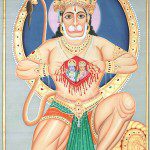We are doing a scripture study together: reading along through some scriptures and discussing the passages. Today is the third post of my favorite Upanishad: The Katha. This is the story of a boy who chatted with the God of death.
Part Two http://www.angelfire.com/electronic/awakening101/upani_katha.html
Chapter II
1
Yama said: The good is one thing; the pleasant, another. Both of these, serving different needs, bind a man. It goes well with him who, of the two, takes the good; but he who chooses the pleasant misses the end.
2
Both the good and the pleasant present themselves to a man. The calm soul examines them well and discriminates. Yea, he prefers the good to the pleasant; but the fool chooses the pleasant out of greed and avarice.
3
O Nachiketa, after pondering well the pleasures that are or seem to he delightful, you have renounced them all. You have not taken the road abounding in wealth, where many men sink.
4
Wide apart and leading to different ends are these two: ignorance and what is known as Knowledge. I regard you, O Nachiketa, to be one who desires Knowledge; for even many pleasures could not tempt you away.
5
Fools dwelling in darkness, but thinking themselves wise and erudite, go round and round, by various tortuous paths, like the blind led by the blind.
6
The Hereafter never reveals itself to a person devoid of discrimination, heedless and perplexed by the delusion of wealth. “This world alone exists,” he thinks, “and there is no other.” Again and again he comes under my sway.
7
Many there are who do not even hear of Atman; though hearing of Him, many do not comprehend. Wonderful is the expounder and rare the hearer; rare indeed is the experiencer of Atman taught by an able preceptor.
8
Atman, when taught by an inferior person, is not easily comprehended, because It is diversely regarded by disputants. But when It is taught by him who has become one with Atman, there can remain no more doubt about It. Atman is subtler than the subtlest and not to be known through argument.
9
This Knowledge cannot be attained by reasoning. Atman become easy of comprehension, O dearest, when taught by another. You have attained this Knowledge now. You are, indeed, a man of true resolve. May we always have an inquirer like you!
Chapter-II http://www.vedarahasya.net/katha-2.htm
Yama continues: “O Naciketas! What we call as ‘Sreyas’ and as ‘Preyas’ are two different things of contradicting nature. Both of them are aimed at attracting the Purusha or the Jivan into doing certain specific things and to arrest him within that range. Out of this, the one who follows ‘Sreyas’ attains good results here and in the hereafter. The one who chooses to adopt ‘Preyas’ loses control of himself and of his spiritual progress.
Both Sreyas and Preyas come in search of a man. The wise man analyzes both in all aspects and understands the difference between them. He deserts the path of ‘Preyas’ and adopts ‘Sreyas’. The idiot, who is interested only in earning wealth and in protecting it takes on the path of ‘Preyas’.”
“O Naciketas! You have identified the worldly desires as hindrances to one’s spiritual progress and have chosen not to follow them. These desires, however, are very attractive and quite easily hypnotize any one of a strong will and make them run in search of their fulfillment. You have been very strong enough (in your mind) to come above this hindrance. You have not adopted that path of illusion (of making wealth and of protecting it) in which all people get immersed and lose themselves (the self referred to here being the Atman).”
“The path that avidyaa (or ignorance) leads one to and the path that vidyaa (or knowledge) takes one through are extremely different ones and are very far from each other. O Naciketas! I understand that you are the one in search of knowledge since you are not interested in fulfilling all the worldly, material desires that I offered to grant you. Those desires did not move you even an inch from your strong focus (of attaining the knowledge).”
“Those fools who are sunk in the ocean of ignorance think and feel that they are the really wise ones and that they are the masters (of knowledge). They are comparable to the blind who are led by the blind again. They do not reach their ultimate destination and will just be encircling the same place.”
“This knowledge about the Heaven and about the knowledge of the Atman will not be understood by that one who is not deeply interested in it and by those idiots who are attracted by the worldly wealth and desires. Such people tend to think that there is no such thing as Heaven or Hell and that what exists is only earth or the world. Those are the ones who get into my trap time and again”.
“It is quite rare to know even little regarding that thing (the knowledge) about which many people have not even heard of and even those who have heard of have not understood a fraction of it. It is rare to get someone who can explain about it. It is rare again to get someone who can understand and grasp it. Rarest of rare it is to get someone who is taught (about this knowledge) by an expert teacher and who understands it fully well.”
“The Atma cannot be understood if told by a man of a lower stature (by knowledge), because different people perceive it as many different things. If it is taught by one who has crossed the principles of duality and who has identified himself with the Brahman, there would not be any scope for misunderstanding. Since it is smaller than the smallest atom and finer than the finest one, it cannot be understood by the process of debate and discussions. (called as dharkam)”
“O Dear Naciketas! The knowledge that you have attained is something that cannot be attained by dharkam. It can only be learnt first-hand from a learned, wise teacher. You have a very strong will and heart. Quite surprising! I only wish that I should get more (aspiring students) like you (who are interested in learning this knowledge).”
Commentary (Swami Krishnananda)
“An experience seems to be pleasant because of the reaction of our nerves. A condition that is brought about as a result of a reaction is passing, and not being.”
“Yama tested Nachiketas in the same way as this world tests us. Temptations come every day, in every thing we see.”
“Death is the best teacher; there is not a better one: vairagya dawns by meditation on death. Suppose death comes to you in five minutes. Suppose you know it. What will you do? Will you act as you act now? You will act differently. It is true that we may die any moment. Yet, we do not think of it. ”
“Seekers who have done sadhana for years may not progress well. Often, a silent complaint is heard from within that nothing has been achieved. This is so because, while they restrain themselves physically, they indulge on the psychic level. So, the most important thing in spiritual practice is honesty to oneself, because the path is of one’s own Self, or Atman, and external aid is of little value. ”
“It is very easy to fall, and it is even pleasant, but it is very difficult to rise again.”
“…when they come, they come not as temptations, but look like necessities. When you know that they are temptations, obstacles, you will not fall. They are temptations only so long as you do not understand them. If you know your enemy, you will be careful. So, they come with a mask, and you are deceived.”
“Desire is ignorance because it arises on account of a misunderstanding. Why does a moth fly into the fire? It does so because of its ignorance. It does not understand the structure of fire. Similarly, people go to sense-objects because they do not know that they are harmful”
“Both duty and desire, the good and the pleasant, have been examined by Nachiketas. This position is not one of acquisition, but of understanding, of discrimination. He is the example of a seeker who got over temptations by comprehending, and not because they were curbed by law, scriptures or the guru.”
“Nachiketas realised that objects are not to be acquired for enjoyment, but to be understood and studied. They are not for hugging. The world is not to be possessed. No one can possess the world, because everyone is a part of it; belongs to it in an integral way. So an individual fails when he treats it as an object of enjoyment, for the world and all its objects are an opportunity to train ourselves in understanding.”
My Thoughts
One of my favorite sentences ever: “The good is one thing and the pleasant another. These two, having different ends, bind a man.” We don’t always make that distinction between good and pleasurable.
“You have not taken the road abounding in wealth, where many men sink.” Indeed! This is the narrow path, the extremely difficult navigation of choosing the eternal good over transitory pleasures. I know I don’t make the correct choice most of the time. I try to, but the mind and desires can be very overwhelming.
There are so many great quotes in this Upanishad! It makes me want to just recite it over and over again all day.
Another important place, I think, is the “Many have not even heard of the Atman (the Self, the God within).” Of those who have heard of Him, fewer understand. Even fewer are able to teach and explain it to others. It has the feeling of a secret knowledge, somewhat like the Gnostic gospels in Christianity.
It cannot be understood by study and knowledge alone. For those of us who focus on a jnana yoga path, this is important remember. In all our study and reading and learning, we must take a step back and truly know and understand God.
The Swami reiterates a common idea that we are told: live as if each moment might be your last. It’s a good principle for getting the most out of life. Usually when we hear this, we think of our “bucket list” (all the things we want to accomplish before we die, i.e. “kick the bucket”. Places to see, things to learn). That’s all well and good, but the kind of bucket list we’re talking about here is the spiritual one. If we know we were going to die tomorrow, would we spend today flying to Peru or meditating? If I were planning for my death, I’d be thinking about how do I calm my mind? How much can I focus on God? And that’s how we should be every day.















